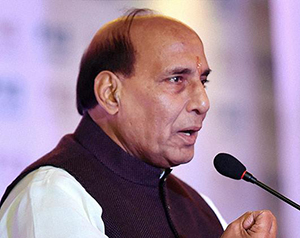Islamabad, Aug 3: Home Minister Rajnath Singh today arrived here to attend the SAARC Interior Ministers' conference tomorrow during which he is expected to raise the issue of most wanted terrorist Dawood Ibrahim and cross border terrorism.
Accompanied by a delegation comprising officials from his ministry and external affairs, Singh, who is on his maiden visit to Pakistan, will be underlining the need for meaningful cooperation among the South Asian countries.
Before leaving for Islamabad to attend the day-long SAARC Home Ministers Conference, the Home Minister said he was "looking forward to underscore the imperative of meaningful cooperation within the region against terrorism and organised crime."
"This Conference provides a platform to discuss issues pertaining to security," said Singh, who is expected to tell Pakistan to stop sponsoring terror in India and rein in groups like Lashker-e-Taiba and Jaish-e-Mohammed.
Singh's visit comes notwithstanding threat by LeT founder Hafiz Saeed, who warned of a countrywide protest in Pakistan by his outfit if Singh arrives in Islamabad to attend the SAARC ministerial conference.
Tomorrow's meeting is preceded by the 7th Meeting of the SAARC Interior/Home Secretaries which is being held today. The Union Home Secretary Rajiv Mehrishi, who is leading the Indian delegation, arrived here yesterday.
There is little possibility of Singh having a bilateral meeting with his Pakistani counterpart Chaudhry Nisar Ali Khan in the wake of strain in Indo-Pak relations after the killing of Hizbul Mujahideen militant Burhan Wani in Jammu and Kashmir on July 8.
Not only did Pakistan Prime Minister Nawaz Sharif praise Wani but he also remarked that "Kashmir will one day become Pakistan", a comment which evoked a sharp reaction from External Affairs Minister Sushma Swaraj, who said his dream of the state becoming a part of his country "will not be realised even at the end of eternity".
Apart from terrorism, other key issues to be discussed include liberalisation of visa, illegal trafficking in narcotic drugs, psychotropic substances and small arms and how to make coordinated and concerted efforts to combat such menace.
The three-tier meeting began at the joint secretary-level and then moves on to Secretary and Home Minister-level meetings.
The focus of the meeting will also be on strengthening networking among police forces of SAARC member-countries and also enhance information-sharing among law enforcement agencies.





Comments
Add new comment